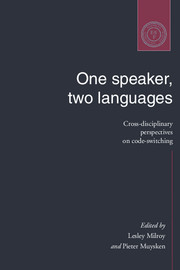Book contents
- Frontmatter
- Contents
- Notes on contributors
- Acknowledgments
- 1 Introduction: code-switching and bilingualism research
- Part one Code-switching in institutional and community settings
- Part two Code-switching and social life
- Part three Grammatical constraints on code-switching
- Part four Code-switching in bilingual development and processing
- 12 A psycholinguistic approach to code-switching: the recognition of guest words by bilinguals
- 13 Code-switching in bilingual first language acquisition
- 14 The code-switching behaviour of adults with language disorders – with special reference to aphasia and dementia
- 15 Conclusion: code-switching research as a theoretical challenge
- Index
13 - Code-switching in bilingual first language acquisition
Published online by Cambridge University Press: 05 June 2012
- Frontmatter
- Contents
- Notes on contributors
- Acknowledgments
- 1 Introduction: code-switching and bilingualism research
- Part one Code-switching in institutional and community settings
- Part two Code-switching and social life
- Part three Grammatical constraints on code-switching
- Part four Code-switching in bilingual development and processing
- 12 A psycholinguistic approach to code-switching: the recognition of guest words by bilinguals
- 13 Code-switching in bilingual first language acquisition
- 14 The code-switching behaviour of adults with language disorders – with special reference to aphasia and dementia
- 15 Conclusion: code-switching research as a theoretical challenge
- Index
Summary
Introduction
Extensive research over the last twenty years on language contact phenomena and especially in the domain of code-switching has led investigators to agree that bilingual code-switching can be characterised as being governed by grammatical as well as pragmatic constraints. However, up to now, the development of such formal and functional principles during the course of the linguistic development of bilingual children has not been studied to a larger extent.
With respect to pragmatics, we still know little about how and when the bilingual child discovers that the use of both languages in its environment is governed by social and pragmatic rules. As far as the acquisition of grammatical constraints is concerned, we are facing theoretical as well as empirical problems. On the one hand, the debate on the formulation of universal grammatical constraints on code-switching is still very much open, concerning cross-linguistic validity as well as the specific formulation within grammatical theory. On the other hand, we cannot examine the acquisition of grammatical constraints on code-switching without taking into account the linguistic development of the child in both languages.
In what follows, we will briefly summarise the knowledge currently available on these issues. We will then present a number of findings from our research based on the analysis of bilingual children living in a German community, who acquire German and French simultaneously. We will also try to contribute to a clearer classification and explanation of bilingual children's mixed utterances.
Information
- Type
- Chapter
- Information
- One Speaker, Two LanguagesCross-Disciplinary Perspectives on Code-Switching, pp. 276 - 301Publisher: Cambridge University PressPrint publication year: 1995
Accessibility standard: Unknown
Why this information is here
This section outlines the accessibility features of this content - including support for screen readers, full keyboard navigation and high-contrast display options. This may not be relevant for you.Accessibility Information
- 42
- Cited by
